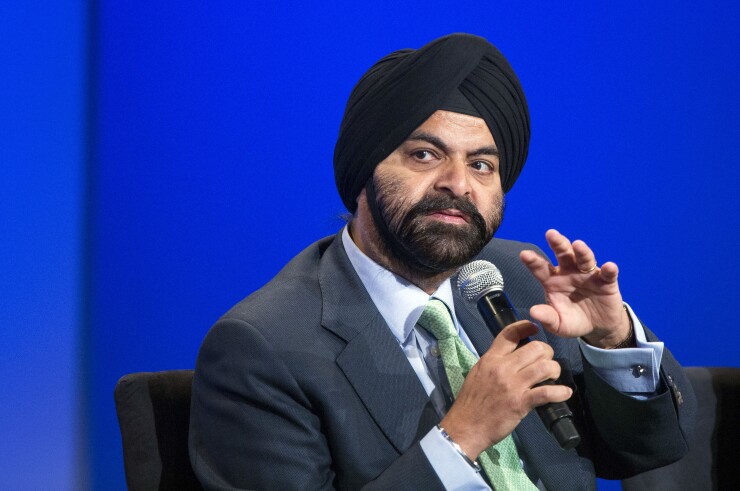Brexit seems more likely than ever, as the U.K.'s new prime minister, Boris Johnson, has committed to meeting the October 31 deadline for a deal to leave the EU. But despite the lingering uncertainty over how that will happen, Mastercard is not abandoning its bullish stance on Europe.
Part of the reason for the Purchase, N.Y., company's optimism is there’s opportunity to convert cash to digital in Europe, which is not a fully mature electronic payments market, contends Mastercard CEO Ajay Banga.
“Europe is a growth market for our company and we see no reason to change that,” Banga said during Tuesday morning’s earnings call.

"The U.K. is still a market where people are spending and growth remains healthy," Banga said, adding that there could be economic pressure if there's still uncertainty up to the Oct. 31 deadline.
Europe in general is a cash-heavy economy, so there’s an addressable opportunity to convert cash to digital, Banga said, adding that beyond the mature Nordic digital payment markets, most continental European countries have space to build digital acceptance. In the first quarter 2019, merchant acceptance in Europe grew 10%, Banga said. “So this is not a developed payments market,” Banga emphasized.
The continent’s existing card infrastructure has a hard time adjusting to the fast pace of payments innovation, Banga said, adding Mastercard can rely on its scale and existing technology to compete with larger competitors such as Visa, which has acquired Visa Europe, and local card schemes. “Most of these local schemes find it hard to keep pace with innovation and tend to come to us for help in gaining a stronger foothold,” he said.
Banga also predicted a benefit from the marketing of the single
The card brands are pushing the buy button as a way to standardize e-commerce card payments in a manner similar to offline card payments. SRC is also seen as a rival to PayPal and other digital payment providers. Mastercard is testing SRC with issuers and merchants, and is working on Masterpass upgrades as part of the program.
The initial retailers to adopt SRC include Expedia, Saks Fifth Avenue and Tickets.com. The SRC should launch in the U.S. in the “next few months,” Banga said.
SRC fuels Mastercard initiatives in other areas of digital commerce, such as the use of artificial intelligence and tokenization to support the card brand’s digital wellness program. Mastercard is working with Worldpay, Square, Adyen and Stripe, among others, to bolster cybersecurity.
“Once we get the testing complete and start rolling SRC out to the broader marketplace we will see the whole industry making an effort to market and do promotion to get consumers used to the idea of using one button to checkout,” Banga said.
Under investor questioning, Banga addressed a movement in Australia to
For the second quarter ending June 30, Mastercard reported net income of $2 billion, up from $1.6 billion the prior year; or $2 per share, up from $1.50 per share a year earlier. Adjusted earnings per share were $1.89, up from $1.66 and better than the $1.83 projected by analysts.
Revenue was $4.1 billion, up from $3.7 billion a year earlier, in line with analyst expectations.





